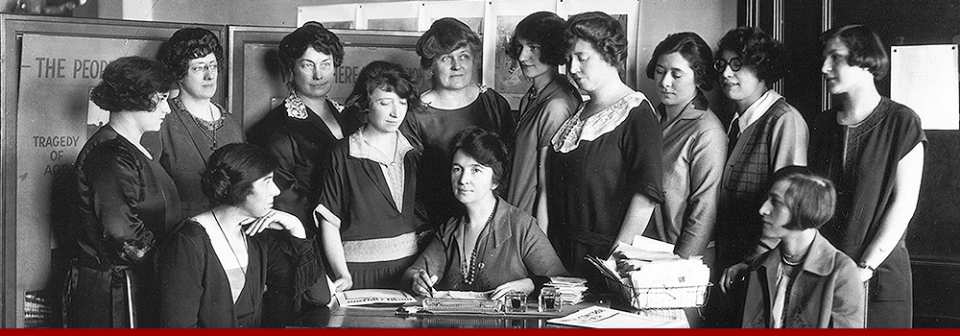On September 28, 1933, Margaret Sanger was invited to a dinner and reception for First Lady Eleanor Roosevelt sponsored by the twelfth annual Exposition of Women’s Arts and Industries. The meeting highlighted women’s activities in business, clubs and the professions. Sanger was also asked by the National Recovery Administration to give a five-minute speech at the dinner, one of a number of prominent speakers invited.
The Exposition was held at New York City;’s Hotel Astor, and featured booths that celebrated both traditional women’s work and new avenues for employment, such as aviation and politics. The Girls Scouts held the finals of its best Girl Scout cake baking contest, and there was a political forum each evening with speakers from the Women’s Committees of the Fusion and Democratic parties.
With an important presidential election coming up shortly, we thought that both Roosevelt and Sanger’s comments were instructive: First, from Eleanor Roosevelt:
It is always a thrill to see what women are doing, and what they can do, in business. It adds to my already firm conviction that women are becoming more and more of an influence in every walk of life. It is true that women are becoming more influential and more respected for their thought that is spreading throughout the world, and action has always followed real thinking, and a great deal depends on what and how they think in the next few weeks. Whether the new conditions are satisfactory and helpful depends greatly upon what the women of our country decide. Therefore, with their added influence they have added responsibility. (Boston Globe, Sept. 29, 1933, p. 27)
When it came to Margaret Sanger’s speech, she exhorted women to demand better, to demand the same consideration that men were getting:
It was President Roosevelt who had the courage, foresight and vision to raise his voice on behalf of the forgotten man, and is it not time for the enlightened women of this country to raise a voice in unison on behalf of the most forgotten of all living creatures, the overburdened child-bearing woman? Why not a new deal for the 43 million women of child-bearing age in this country whose future life, liberty and pursuit of happiness depend absolutely upon the knowledge of how to control the physiological function of motherhood?
We ask a “new deal” for the mother immortalized in poetry but neglected in fact–
A New Deal for the mother whose life is shadowed by constant fears of unwanted pregnancies–a New Deal for the mother who goes down into the valley of the shadow of death for every baby born–
A new consideration for the women who appeal for contraceptive knowledge to hospitals, clinics, and social agencies, and are denied this by priest and politician alike.
The solidarity of woman is as noble as the brotherhood of man and the opportunity is here today for all of us whose lives have been benefited by such knowledge to pass that right and privilege on to the underprivileged woman who is too poor, too weak, too inarticulate to battle for her own rights.
In 1933, Sanger was enmeshed in a multi-year lobbying campaign to remove birth control from the list of obscene materials that could not be mailed in the United States. This battle would not be won in Congress, but three years later in the courts, with the U.S. v. One Package decision. Sanger’s papers document the struggles women endured to secure reproductive freedom, and should serve as a warning about what might occur should we be unwilling to work to keep them.
For the complete text of Sanger’s speech, see The Selected Papers of Margaret Sanger, Volume 2: Birth Control Comes of Age, 1928-1929.
For more on Sanger and Eleanor Roosevelt, see our newsletter article, “Margaret Sanger and Eleanor Roosevelt – The Burden of Public Life.”



Excellent!!!